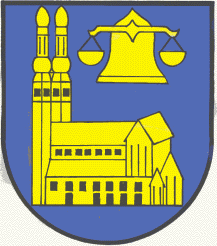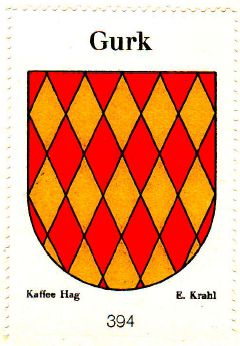Gurk: Difference between revisions
Knorrepoes (talk | contribs) m (Text replace - "Österreich" />" />" to "Österreich" />") |
Knorrepoes (talk | contribs) m (Text replace - "[[Literature" to "{{media}} [[Literature") |
||
| Line 24: | Line 24: | ||
|align="center"|[[File:gurk.hagat.jpg|center]] <br/>The arms in the [[Kaffee Hag : Die Wappen der Republik Oesterreich|Coffee Hag album]] +/- 1932 | |align="center"|[[File:gurk.hagat.jpg|center]] <br/>The arms in the [[Kaffee Hag : Die Wappen der Republik Oesterreich|Coffee Hag album]] +/- 1932 | ||
|} | |} | ||
{{media}} | |||
[[Literature]] : Image provided by Karl Palfrader (k.palfrader@aon.at) | [[Literature]] : Image provided by Karl Palfrader (k.palfrader@aon.at) | ||
Revision as of 22:23, 8 July 2014
| Heraldry of the World Civic heraldry of Austria - Österreichische Gemeindewappen |
GURK
State : Kärnten
District : Sankt Veit an der Glan
Origin/meaning
The arms were officially granted on February 20, 1969 and again on June 8, 1973.
From the Middle Ages on, a bishop resided at Gurk to take care of the Carinthian parts of the archdiocese of Salzburg. A beautiful Cathedral was built at Gurk, a well-known example of the Romanesque style in Austria.
According to tradition, St. Hemma, the inofficial patron-saint of Carinthia, supervised the building personally. It is said that every labourer received his just wages - even when he tried to grab more than his due out of the money-bag at the accounting table.
The arms refer to this tradition, depicting the Cathedral at Gurk.
| The arms in the Coffee Hag album +/- 1932 |
Contact and Support
Partners:
Your logo here ?
Contact us
© since 1995, Heraldry of the World, Ralf Hartemink 
Index of the site
Literature : Image provided by Karl Palfrader (k.palfrader@aon.at)












